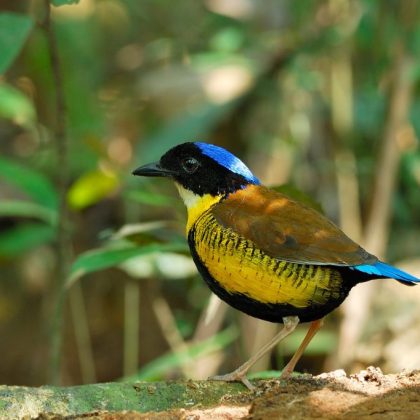Forest birds and plantations
Tropical forests harbour a very high proportion of the planet’s terrestrial biodiversity, supporting wildlife communities that are more diverse and more species-rich than any other habitat.

Tropical forests harbour a very high proportion of the planet’s terrestrial biodiversity, supporting wildlife communities that are more diverse and more species-rich than any other habitat.

We are in the midst of a biodiversity, climate, and pollution crisis for which solutions are urgently needed. As the drivers of this crisis span all aspects of society, science and technology, a shift in the evidence base used to find solutions is required. We need to move beyond traditional mono-disciplinary paths if we are to achieve the scale and urgency of change needed. Yet how we define these new approaches is fraught with difficulty. As researchers, we are increasingly asked to work in transdisciplinary, interdisciplinary, multi-disciplinary, cross-cutting, cross-disciplinary or cross-curricular ways. These terms are often used synonymously and without much reference to their origins, meaning or the methodological or philosophical differences they imply. Despite these challenges, the adoption of research approaches that examine global challenges more holistically is critical.

Cameroon has pledged to restore over a quarter of its land or 12,062,800 ha, Guatemala has pledged over 10% of its land for restoration with 1.2 million ha, India committed over 8% of its land, a staggering 26,500,000 ha to restoration, and the list of countries pledging hectares of land to restoration continues.

The new policy from the OSTP promises a leap forward in the speed of transition to open research in the United States.

Anna Munks, Managing Editor of BJPsych Advances and BJPsych Open, speaks to us about the importance of peer review for the Royal College of Psychiatrists (RCPsych).

We asked our authors what they consider to be the biggest obstacles when it comes to peer reviewing. Author 1: The reader who just doesn’t connect with my approach, or even see what I’m trying to do.…

Cambridge authors offer their opinions on what makes a good peer reviewer. Author 1: A good peer reviewer should be a person of integral academic standing and an acknowledged expert in the field.…

A selection of our authors describe how they see the peer review process evolving in the future, and discuss what change has already taken place.…

A selection of Cambridge authors tell us what they like and what they don’t like about peer review reports. Author 1: Most helpful are comments on concrete issues attached to what is on paper in the manuscript, from spelling errors to formats of quotation to ambivalent expressions; unclear reasoning; missing or faulty references; suggestions for shortening; avoidance of redundancies; necessary/suggested expansion of reasoning; addition of illustrative examples etc.,…

If you’re about to begin peer reviewing your first book, you need to read these dos and don’ts from a selection of Cambridge authors.…

The University Collaboration Budget (UCB) funds initiatives that involve direct collaboration between the University and Cambridge University Press (Academic). Winning initiatives strive to further our shared aims, such as research excellence and integrity, scholarly communication and challenging elitism. UCB initiatives are wide-ranging - from developing free online teaching resources for learning scientific computing, to hosting a major academic event to celebrate the anniversaries of Mahatma Gandhi’s birth and visit to Cambridge.

About Constance: I’m currently studying for my master’s in publishing at University College London, and in 2021 I graduated from Durham University with a degree in English Literature.…

We were excited to hold the JFM/FLOW 2022 China Symposium in Xi’an in June 2022. This is the second time Journal of Fluid Mechanics (JFM) has held a symposium in China but the first which included our new journal Flow. …

Why Cambridge University Press will no longer be offering deeply discounted print as part of new journals agreements.

As part of our celebrations for Pride Month, we hear from Mandy Hill (Managing Director, and EDIB Champion, Academic), Valarie Guagnini (Head of EDIB, Academic), and Ian McIver (Content Team Lead, Academic Books, and Pride Network committee member) as they discuss LGBTQ+ awareness and representation at Cambridge University Press.…

Open research is currently a major topic for researchers in the social sciences. We spoke to applicants Meng Liu and Kiera McNeice to find out more about their UCB initiative ‘Promoting Open Scholarship in Applied Linguistics’.

The University Collaboration Budget (UCB) funds initiatives that involve direct collaboration between the University and Cambridge University Press (Academic).

When I first worked in Madagascar in 2005, I was carrying out biodiversity surveys in little known forests, but by the time I left a decade later I was spending much more time working with rural farming and fisher communities that I was with the birds and the beasts.…

The ratification of the Paris Agreement opened a new chapter in Turkey’s climate policies. Followed by the declaration of a net-zero emissions target for 2053, Turkey’s ratification of the agreement came after a six-year delay, with exhausting bilateral post-Paris negotiations.…

As the 2022 ALPSP University Press Redux Conference co-organised with Cambridge University Press draws close, Ben Denne reflects on the importance of this year’s event.

As the 2022 ALPSP University Press Redux Conference co-organised with Cambridge University Press draws close, Andri Johnston highlights the sustainability panels at this year’s event.

Today marks the release of the first batch of articles in Environmental Data Science (EDS). We are thrilled to celebrate Earth Month with this first release of articles!…

Valarie Guagnini highlights the upcoming Redux 2022 panels on diversity and EDIB.

How practical changes can result in significant environmental gains.

Cambridge University Press are delighted to be supporting and celebrating International Women’s Day 2022. We are actively working to #BreakTheBias by calling out gender bias, discrimination and stereotyping to forge a diverse, equitable and inclusive world.…

Water is a basic subsistence need for all forms of life, but its supply is limited. Therefore, increasing water conservation efforts worldwide is essential and particularly under the current increasing warming.…

When The Global Pandemic started two years ago, Cambridge University Press was quick to react with a number of extraordinary initiatives that supported not only the goal to work towards eradicating the virus, but also our mission to advance learning, research and knowledge worldwide. …

We recently partnered with Tsinghua University on a three-day virtual event "The Voice of Chinese Scholars”.

In July 2021 Cambridge University Press worked with an external research agency to explore a number of key areas around researcher awareness and needs in open access (OA), impact and pain points.…

2021 may be over, but we couldn’t pass up the opportunity to sit back, relax, and look back at some of our publishing highlights from the past year! Which books and Elements were you reading in 2021? What articles were being talked about on Twitter? Welcome to our 2021 content roundup!